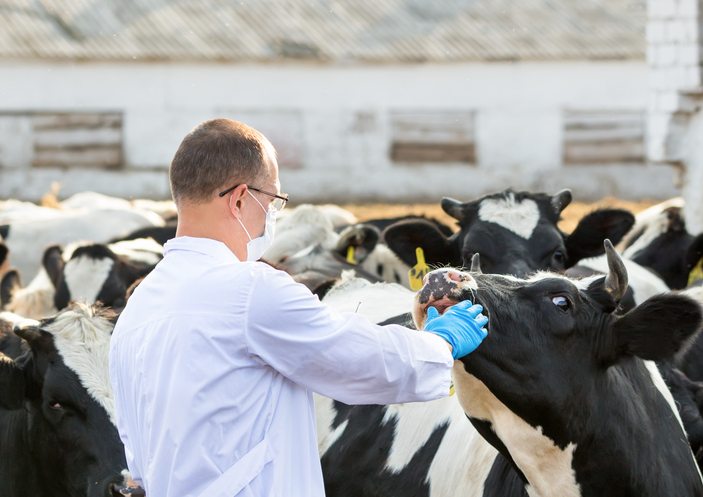
Finding the right balance of nutrition for cows is a major part of achieving a successful farming operation and optimizing feed manufacturing products. Nutrition plays a huge role in the value of beef and dairy products, breeding stock, and manufacturing feed. Because of this, most farmers and feed manufacturers make it a priority to find ways of boosting nutritional intake and quality of nutrition for cows.
Concerns for Farmers:
- Providing high-quality feeding options that will improve the health of their livestock.
- Using nutrient-rich feeds that enhance performance and production of their cows.
- Finding cattle feed with a long shelf-life and resistance to spoilage, rot, mold, bacteria, and moisture.
Concerns for Feed Manufacturers:
- Finding solutions that improve the shelf-life of their cattle feed.
- Providing nutrient-rich livestock feed that enhances the health and productivity of cows.
- Offering feed options to cattle farmers that increase livestock value.
- Saving money and improving feed value with less waste during manufacturing process.
Nutrition for Cows that Improves Health
Dairy production:
Achieving optimal nutrition for cows in the dairy industry requires a focus on feeds that offer adequate concentrations of nutrition that support milk production, fermentative digestion, and metabolic health. Voluntary feed intake among cattle depends on the breed, type of feed and environmental factors. For example, voluntary feed intake increases when ambient temperature decrease, and it decreases as ambient temperature rise. To ensure dairy cows are producing healthy milk, farmers look for feeds that use nutritional supplements and additives to improve milk yield, digestive function, and rumen bacterial population.
Beef production:
Nutrition for cows being raised for beef production requires diets with a high-quality supply of vitamins, minerals, protein, and water. A healthy diet will augment the growth and quality of beef cows. Nutrient-rich feeds are especially important in young beef cows and breeding stock.
In many cases, manufacturers will use supplements and additives to increase the nutritional value of cattle feed. An added benefit for most high-quality additives is the inclusion of flavorings that improve palatability and encourage optimal consumption rates among cows.
Improved Performance and Production
A variety of factors can affect nutrition for cows, but there are four categories that span across all types of cattle.
4 components that Affect Nutritional Requirements:
- Maintenance – Certain combination of nutrients are needed for a cow to support digestion, tissue repair, daily activity requirements, and other functions. Although, there are many factors that affect the amount of nutrients required for vital functions, for a high producing cattle, only a smaller proportion of nutrients needed for maintenance. For example, colder or hotter the temperature, deviating from optimum comfortable temperature, the greater will be the maintenance requirements.
- Growth – Different breeds of cows each have specific nutritional requirements that influence their growth. Weight, muscle-to-fat ratio, and growth rate can all be enhanced with supplements and additives that supply nutrition.
- Lactation – Milk production varies depending on the diet of the cow. Nutritive additives in dairy cattle enhance rumen microbial protein production, and fiber digestion, resulting in increased milk production and milk fat production.
- Reproduction – Cows typically require dietary adjustments during the last three months of pregnancy to support fetus growth. Better nutrition with optimum macro and micronutrients greatly influence the health and growth rate of developing fetuses.
Improving the Quality of Cattle Feed
With so many specific dietary requirements, achieving the optimal level of nutrition for cows often necessitates the inclusion of feed additives. This is especially true in dry regions where water and vegetation shortages are common. Seasonality can also influence the availability or access to natural sources of nutrition that ruminants rely on. Snow, rain, and other weather elements directly affect the level of vegetation and water supply.
Farmers looking for ways to provide a dietary boost should look no further than a high-quality feed with additives that meet nutritional standards. Feed additives, both nutritive and nonnutritive, work to ultimately improve the health and productivity of animals.


Sir please give us tips on enhance digestibility of animal feeds for dairy cows in India.
Thanks for the terrific post, there’s a lot of great information in here.
Dairy & beef animal nutrition mainly depend on TDN (Total Digestible Nutrients) of different raw materials, along with that, suitable organic minerals should be chosen to rectify fertility, ad skin disorders in high lactating animals. Copper management should be taken care of in HF breed.
Thanks for your comment about how farmers want stockfeed that will make their animals healthy. I like how you said that they should be full of nutrients to help them perform better. My father is a farmer and is considering stockfeed supplies to find feed for his cows.
It’s interesting how you said that the seasons can change the availability of certain nutritional sources needed for stock feed and other things like that. Getting the nutrients your animals need to them in the best way possible would be a huge priority whether you are using them for food or what they produce for food. Keeping them healthy would mean that you would be healthy as well in the long run.